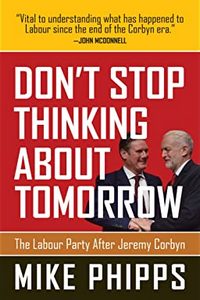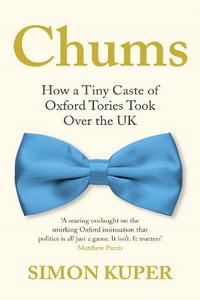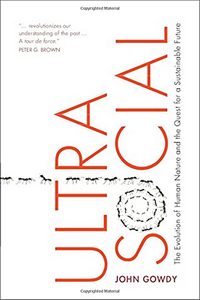Book reviews – After Corbyn / Chumocracy / Ultrasocial
No vision
 Don’t Stop Thinking About Tomorrow. The Labour Party After Jeremy Corbyn. By Mike Phipps. 220 pages. OR Books, 2022.
Don’t Stop Thinking About Tomorrow. The Labour Party After Jeremy Corbyn. By Mike Phipps. 220 pages. OR Books, 2022.
Written by a Labour left-winger, the first part chronicles how Starmer reneged on the promises he made during the Labour leadership elections to get left-wingers to vote for him and then, under pressure from Blairites and party bureaucrats, turned on the Left, withdrawing the whip from Corbyn and reintroducing bans and proscriptions (leading to the expulsion of Ken Loach); in fact to make a complete break with the Corbyn interlude.
In the second part Phipps offers left-wingers some hope – hence the book’s title – but at local council rather than national level. He talks of ‘municipalism’, where left-wing Labour councils do something to improve the lot of the people there, a revival of the “municipal socialism” of yore, even though today local councils have much less power and are much less democratic than they used to be.
Judging by this book, the Labour Party’s left-wing is not what it used to be either. At one time they would say that they stood for ‘socialism’, even if for most of them it was state capitalism (full-scale nationalisation), but at least they envisaged socialism as a system of society. Today’s Labour left-wingers, although they still refer to themselves as socialists, no longer see socialism like this. For them, the word doesn’t exist as a noun but only as an adjective as in ‘socialist policy’, ie, particular reforms intended to benefit the workers under capitalism (if they work). In short, visionless reformists.
Phipps devotes half a dozen pages to why those who joined during the Corbyn interlude should stay in the Labour Party. His argument is basically that, if you are to have any chance of achieving the reforms you want, you need to be in a party that is in a position to form a government and implement them. He has a point – if reforms are all you want. If, however, you are looking for anything more your place is not in the Labour Party.
ALB
The Chumocracy
 Chums. By Simon Kuper. Profile Books. 2022. £16.99
Chums. By Simon Kuper. Profile Books. 2022. £16.99
Simon Kuper is a writer and columnist for the Financial Times, specifically the FT Weekend magazine. He was also the co-author of Soccernomics, which analysed the finances and tactics of modern football as they have emerged in western Europe in recent decades.
Kuper is an excellent writer, arguably one of the best, and while his politics is not ours, he is a provocateur who thinks seriously about current affairs and trends, always looking for unconventional angles to analyse familiar issues. And in Chums: How A Tiny Caste of Oxford Tories Took Over the UK, he has done it again.
For a start, 11 of the 15 post-war Prime Ministers (at the time of writing) went to Oxford. And five of these went to the very same school, Eton. In the 1980s and early 90s a group of politically minded students were at Oxford at similar times and Kuper – who was at Oxford himself then – has dissected their influence, political trajectory and growing power.
The incubating role of the Oxford Union debating society for toffs and aspiring toffs is paramount, the infamous and elite Bullingdon Club that Johnson, Cameron and Osborne were part of arguably less so, but Kuper chronicles it warts and all. His key insight is about Brexit, because in many ways it was at Oxford at this time that Brexit was conceived. Patrick Robertson, the founding secretary of the Bruges Group, was prominent at Oxford in this period, as was fellow Tory and later MEP Daniel Hannan, who set up a similar organisation of his own and was also to help Michael Spicer found a grouping of anti-EU MPs that became the European Research Group. Alongside these came Dr Alan Sked’s Anti-Federalist League, the forerunner of UKIP – and hence an entire Brexit ecosystem was formed.
The later role of Boris Johnson and Michael Gove in Brexit has been well documented and Kuper does not spare them:
‘Brexit was the sort of grand cause that Johnson and Gove had lacked all their political careers. It would give them a chance to live in interesting times, as their ancestors had… It would be a gloriously romantic act, like the Charge of the Light Brigade, only with less personal risk. The Oxford Tories would reclaim parliamentary sovereignty, the birthright of their caste, from the Brussels intruders. In private, they understood that Brexit might not work out brilliantly, but Britain had no natural predators and would survive even a blunder’ (p.160).
Whatever we may think of the Brexit/Remain debate and its ultimate futility, Kuper spots trends that others have missed here. Fascinatingly, there is a close alignment between the subjects that Oxford politicos studied and their subsequent position on the issue. Of the prominent Remainers that were at Oxford nearly all studied Philosophy, Politics and Economics (PPE) – Cameron, Hunt, Hammond, Hancock, Truss, etc as well as the Milibands, Ed Balls, Yvette Cooper and in an earlier period, Mandelson. Yet as Kuper explains:
‘By contrast, all the leading Tory Brexiteers studied backward-looking subjects: classics for Johnson, history for Rees-Mogg and Hannan, and ancient and modern history for Cummings. Gove’s degree was English, which mostly meant the canon’ (p.40)
The overwhelming sense here is of a group of privileged Tory students who thought of themselves as rule-makers not rule-takers, and who were looking for the next grand project once Thatcherism was complete, and one that could hopefully restore their birthright and entitlements. That they succeeded as much as they did is a remarkable testament to the UK’s enduring class system and its networks into business and the press. But as they say, all political careers ultimately end in failure – and this cohort of political careerists has clearly been no exception.
DAP
Social nature
 Ultrasocial. The Evolution of Human Nature and the Quest for a Sustainable Future. By John Gowdy. Cambridge University Press. 2021. xv+165pp.
Ultrasocial. The Evolution of Human Nature and the Quest for a Sustainable Future. By John Gowdy. Cambridge University Press. 2021. xv+165pp.
This is a book supporting the view, as many others have recently, that human nature is not an entirely fixed phenomenon but largely an expression of the material and social situation in which human beings find themselves. It draws upon a vast range of sources to show that, until, around 10,000 years ago when we started to adopt settled agriculture, human beings lived largely cooperative and egalitarian existences as hunter-gatherers with mutual aid and empathy as the social and cultural norm and without destabilising their habitats. The transition from hunter-gathering to agriculture was not, however, as the author points out, a rapid, simple or inevitable change. Rather it was a long-term, incremental process taking place for different reasons in different areas. It was ‘stumbled into’ in a sort of ‘tyranny of small decisions’ for what seemed like practical reasons at the time, but with unanticipated consequences. Yet wherever it did take serious hold, there was no going back and it inevitably led to stratified societies in which a small number controlled the surpluses that were produced and ruled over the vast majority whose lives were made poorer and less secure than before (‘Human society made a critical leap from small-scale cooperation to top-down coordination and coercion’). This led to the development of hierarchies, belief systems to support them and condition their subjects and, eventually, the states that dominate the world today with the elite few possessing most of the wealth.
But Gowdy goes even further than others in arguing that, with the advent of agriculture, human society not only broke away from its purpose of serving its individual members and groups to eventually become what it is today, but embarked on becoming an impersonal ‘superorganism’, which today we see in its most advanced form, the global market, subordinating the interests of the humans who exist under it to its own survival and furtherance. To this ‘autonomous’ superorganism he attaches the label ‘ultrasocial’, in that it operates very much like a huge colony of ants or termites in which the requirements of the whole take precedence over the individuals within it. Unlike ant and termite societies, however, the human superorganism exhibits gross social and material inequality, even if this is often justified as a necessary consequence of the ‘freedom’ of the individual in a ‘free market’. A further consequence of this, the author argues, is rapacious environmental degradation and a catastrophic loss of nature, since no group, state or individual is in a position to prevent the interest of the ‘superorganism’ from dominating and in modern capitalism that means profit is always the ultimate goal whatever the effect on the biosphere. He holds out no hope, therefore, of capitalism being able to regulate itself to prevent ongoing environmental decline and eventually disaster but does hope that such an occurrence will eventually lead to a lifestyle for the humans left after that catastrophe that is closer to the kind of society that existed for the vast majority of humankind’s 300,000 years’ history before it was put paid to by agriculture, states serving the interest of controlling elites, and capitalist production (‘the commodification of people and nature’).
Gowdy’s arguments about all this are complex, many-faceted and multi-layered and it is difficult to do justice to such a ‘grand narrative’ in a short review. So it may seem churlish to highlight certain elements that are less than convincing. But it needs to be said that, despite his pessimism about the ultimate future of humans within a system in which he sees us as trapped, like cogs in a wheel, and his reference to the futility of ‘limited measures within a business-as-usual framework’, the author does propose palliative solutions (‘ a minimal bioeconomic programme’) which he considers might show the way to at least less harsh social arrangements than exist at present and enable us, as he puts it, ‘to start down a new evolutionary path compatible with basic human needs and our place in nature’. These include, perhaps predictably, various social reforms such as guaranteed basic income, tax changes, maximum limit to income and wealth, old-age security, etc. While perhaps reflective of laudable sentiments, these, we would argue – even if they were somehow or in some form to be implemented – would clearly make little impact on the gross inequality that the profit system, portrayed so well by the author himself, inevitably brings with it. He also falls into the ‘overpopulation’ trap suggesting that the earth cannot, whatever the circumstances, sustain the current and increasing population. And he does not consider – and has perhaps never heard – the socialist remedy. We are referring here to majority political action via the ballot box to take control of the system of production and distribution of goods and services and then to operate it in a sustainable, environmentally sound way. This would have to mean harnessing the human propensity to cooperate on the basis of need not profit in a moneyless, wageless society of free access, arguably with the same kind of social relations as – if on a more secure level of technology than – the hunter-gatherer societies that Gowdy describes so graphically and admiringly, and argues ‘human nature’ is best geared to operate within.
Despite these reservations, what we have here is an important book of great insight about human nature and economic and political organisation and one which above all contests powerfully the commonly held ‘evil-human-nature’ notion, Hobbes’s infamous ‘war of all against all’. It adds to the increasing body of unequivocal evidence that ‘human nature’, though selfish, acquisitive and violent behaviour can be part of it, is not a fixed quantity and that, as the author puts it: ‘Our current predicaments are not gene-based. They have risen out of the material base of human economies and the associated cultural adaptations and supporting institutions’.
HKM
